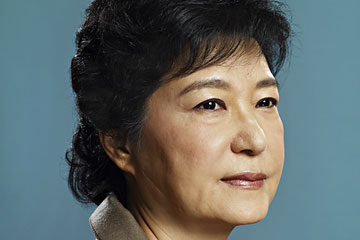
"I know how fleeting and, at times, harrowing political power can be," says Park Geun-hye
(4 of 4)
Like a growing number of his compatriots, Kim believes the economic model that profited South Korea for so long needs an overhaul. Onetime independent presidential candidate Ahn Cheol-soo — a 50-year-old doctor and entrepreneur who dropped out of the race so as to not split the liberal vote with Moon and hand victory to Park — spoke for many fellow citizens in a recent speech. South Korea, he said, was "where children suffer miserably in the fierce competition to enter prestigious universities; where young people cannot find jobs; where parents must tighten their belts more than ever to pay their mortgage and support their children's education." He described the country as "increasingly anxious, lonely and unsure about the future."
This national malaise has doubtless stirred Park's leftward turn. She is promising to "restore [the] middle class" by addressing bread-and-butter issues like household debt and child care. Both camps are pledging to decentralize the economy, but Moon wants more sweeping reforms. South Korea's corporate titans enjoy "unfair privileges," he has said, calling for stronger antitrust laws to protect small and medium-size enterprises.
Indeed, while South Koreans are rightly proud of their world-class brands, especially those in the field of consumer electronics, there's a growing acknowledgment that individual entrepreneurs need help. Been Kim, 30, was a mobile-phone designer for an established South Korean outfit for eight years. The environment, says Kim, was "rigid" and "patriarchal," so she left to start her own design firm Beeeen & Co. Breaking out proved hard. The process of setting up a company was so cumbersome and expensive that she opted to incorporate in business-friendly Hong Kong. And when she realized that male factory managers in South Korea weren't taking her seriously — putting other, bigger, chaebol-linked orders first — she moved production to China. "Korean bosses treated me like a daughter," she says. "In China they treat me like a chairman; they respect what I do."
Odd Woman Out
Park's campaign itself takes place in a man's world. A day on the election trail with her is a whirl of middle-aged men, punctuated by the occasional female journalist or staffer. Her supporters, particularly older men, see her as a "dutiful" daughter (the female counterpart of the filial son). The media like to mention that she is single and childless. When analysts say she is "strong" or "tough," they invariably add "for a woman." Park isn't averse to a little gender stereotyping herself, promising "motherly, female leadership" should she be elected.
South Korea's gender indicators aren't good. There's no shortage of accomplished female graduates, but many drop out of the workforce early, due in part to a macho business culture that marginalizes them. Women with jobs earn on average 39% less than men and are overrepresented among contract laborers toiling with low pay and no benefits. Park has promised to support working women — and increase the country's low birth rate — by fighting workplace discrimination, increasing child-care benefits and supporting single-parent families. "Women can not only succeed as vibrant social leaders but simultaneously as nurturing mothers," she tells TIME. Park's critics say her concern about women's welfare is too little too late. Says labor advocate Jini Park (no relation): "She is playing [an election] trump card."
Whether out of expedience, ideology or epiphany, both Park and Moon are presenting themselves as change agents. First, though, they must deal with their own burdens of history. "I know how fleeting and, at times, harrowing, political power can be," Park tells TIME. Moon, for his part, served as chief of staff to his lawyer friend, onetime President Roh Moo-hyun. Roh rose from humble farming origins to be elected on platforms of freedom and open and clean government. But when his family later became mired in corruption allegations, he leaped to his death from a hill behind his house. For front runner Park — and also, though to a lesser extent, Moon — to win, much of the electorate has to be ready to forgive or forget the past. Perhaps then, South Korea will forge a new future.
— with reporting by Audrey Yoo / Kwangju and Seoul
